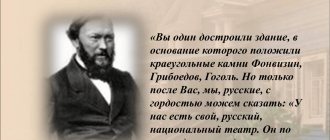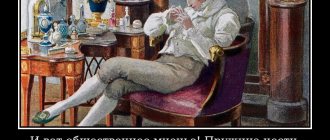". Neither her sister’s beauty, / Nor her rosy freshness, / Would she have attracted the eyes. "
***
". Imagine the clear features / Of provincial simplicity, / And belated outfits, / And the belated style of speeches. "(about Tatiana's clothes)
***
". Wild, sad, silent, / Like a forest deer, fearful, / She seemed like a stranger to her own family. / She didn’t know how to caress / To her father or her mother. "
***
". She didn’t play with burners, / She was bored by the ringing laughter, / And the noise of their windy joys. "
***
". She, as with old friends, / With her groves and meadows, / Still in a hurry to talk. "
***
". You were a pure, fiery soul, / When you wrote to me with such simplicity, / With such intelligence. "(Onegin - Tatiana)
***
Tatyana Larina is a trusting, innocent girl:
". Tatyana (Russian in soul, / Without knowing why) / With her cold beauty / Loved the Russian winter. "
***
". Tatyana believed the legends / of common folk antiquity, / and dreams, and card fortune-telling, / and the predictions of the moon. / She was worried about signs. "
The ideal image of the heroine in the novel “Eugene Onegin”
Pushkin calls his heroine a simple and at the same time very common name - Tatyana. Her character is sincere, folk, natural, but nevertheless she cannot be called a simpleton. The heroine's sincerity is combined with the extraordinary depth of her soul.
She is a big lover of books, brought up on them and the stories of her nanny, and is different from her surroundings. Tatyana is not used to being affectionate with her parents and playing with other children, like all her peers. She appears to readers as a girl somewhat removed from the rest of society. For Pushkin, this is the ideal image of the heroine in the novel “Eugene Onegin”.
She loves nature and lives according to its rhythms and laws, feeling her unity with it. Public opinion is not so important for a girl. But she lives in a world of ideals, sincere soulfulness, high spiritual morality and purity.
She prefers country life, closeness to nature, which she feels and loves. Then, having gotten married, living in St. Petersburg and leading a social life, she will remember with longing the life that she had in her beloved village.
Origin, upbringing
Tatyana is the eldest daughter of the Larins landowners. Her parents were good-natured, hospitable, simple people. Life in their family was monotonous, but the parents were happy with it. Their interests boiled down to housekeeping, to conversations with guests about relatives, haymaking, etc. The Larins' youngest daughter, Olga, was happy in her parents' house, since she was similar in character to her parents.
Tatyana was greatly influenced by her nanny, who told her scary stories and ancient legends. When the girl grew up a little, she became interested in reading novels, moreover, in French:
She didn't speak Russian well
I haven’t read our magazines,
And it was difficult to express myself
In your native language.
The father did not pay attention to his daughter’s hobby, and the mother herself adored Richardson’s novels before her marriage.
Although Tatyana did not read Russian magazines, the work of Martyn Zadeka, an interpreter of dreams, was her favorite book.
A.S. Pushkin, “Eugene Onegin”: heroes and their love
Pushkin describes two vivid images of the main characters in his novel. This is Tatyana Larina, Evgeny Onegin, who oppose each other and at the same time attract. The girl’s pure and sincere soul comes into contact with a young man who has already seen a lot in his life and is disillusioned with life. Onegin's spiritual emptiness and Larina's soul filled to the brim are dramatically revealed in the novel.
It would seem that love should work miracles, and Tatyana, who is strong and sincerely in love, will definitely be able to change everything. Eugene Onegin, however, rejects her after her confession and leaves her completely at a loss. Was it love or passion? Tatyana, being a dreamy girl, fell in love not with a real person, but with an image she invented, which she drew in her dreams.
The young man, who attracted her with his detachment and mystery, those traits that were inherent in her, nevertheless turned out to be not the romantic hero from her dreams and dreams. He turned out to be an empty, disappointed and even corrupted man by the secular life of the capital. But, despite this, noble nobility lived deeply in him, and Tatyana was not deceived. Evgeny Onegin left, leaving the girl in complete confusion.
He had a chance to change and find the soulfulness that he once had. But it was too complex and incomprehensible for him, and the young man, or “young old man,” as critics sometimes called him, decided to simply retire and continue his usual way of life.
Much later, Tatyana Larina and Evgeny Onegin will meet in St. Petersburg. And then the fire of passion will no longer burn her, but Onegin. Tatyana, in turn, having become a high society lady, will not lose her ability to love. However, this time she will reject Eugene - not in order to take revenge or follow the norms accepted in society.
She loves him, no matter what, and does not hide it from him. But she continues to be guided in life by her high spiritual and moral principles and cannot break the vow given to her destined husband. At the same time, she understands that Onegin is not driven by passion and selfish pride. And how can she answer otherwise? Decide to have an extramarital affair? By doing this, she would not only desecrate her love, but also betray herself, sacrificing her inner rules of life.
V.G. Belinsky about Tatyana
The ideal image of the heroine in the novel “Eugene Onegin” was described in detail by V.G.
Belinsky, calling it the image of the truth of a Russian woman, and the novel a real encyclopedia of Russian life. Tatyana, in his perception, is a deep and strong woman, without the painful contradictions of complex souls, which sometimes they themselves are not able to understand. She is whole, united and pure nature. And it doesn’t matter who she is today: a society lady or a simple girl from the village. Wherever she is, high spiritual integrity does not leave her, and no matter what happens to her, she is guided by the values living within her.
The main character of the novel
Eugene Onegin never sought the great and all-consuming love that writers so colorfully describe in their works. The man is bored with social life. Tanya seems to him quite funny and unusual. He is even surprised when he finds out that Vladimir chose Olga as his bride: an ordinary and stupid girl.
When a man rejects Tatyana’s feelings, but does not feel sympathy and does not feel sorry for the poor girl. He says directly and without emotion that even if they get married, the girl may soon tire of him: “Marriage will be torture for us. / No matter how much I love you, / Having gotten used to it, I will immediately stop loving you...” Several character traits of Onegin can be identified:
- cold;
- gallant;
- cynical;
- selfish.
His cynicism is also shown in the episode where, wanting to anger Vladimir according to his plan, Onegin shows signs of attention to Olga , thereby provoking a duel. The man does not think about how Tatyana feels at that moment. After all, he was flirting with his younger sister right before her eyes, but he refused her. And Larina the eldest was very hurt and offended.
Even after their long separation, Onegin could not see in this stately, cold and emotionless woman the same Tatyana: young, soft and kind. I am sure that marriage changed her, hardened Tatiana’s heart: “But an indifferent princess, / But an unapproachable goddess...”
Tatiana and Olga
Tatyana, the ideal image of the heroine in the novel Eugene Onegin, is the complete opposite of her sister Olga. The latter is a flighty girl with a carefree and narrow-minded disposition. Her image is fully revealed in her disdainful attitude towards the young man who fell in love with her - Lensky, who, because of her frivolous behavior, challenges Onegin to a duel and dies there. Tatyana cannot be mentally friendly with her flighty sister; she needs depth and meaningfulness in her own and other people’s thoughts and actions, which Olga cannot give her.
Author's position
Alexander Sergeevich Pushkin is the very first writer who depicted an ordinary Russian woman in the quotation characterization of Tatyana from Eugene Onegin. It is from her portrait that many Russian works begin to describe beautiful and sophisticated young ladies with Russian character and willpower.
The author, through the image of the heroine, described his thoughts and ideas about the ideal woman. At the same time, her character embodied the worldview of Pushkin himself. The writer wanted to show Tanya’s inner beauty, because according to external data, the girl was not a beauty at all.
Natural image
Tatyana is able to contemplate beauty, feel harmony, understand the language of nature and love the world around her. She loves to watch the sunrise and think about the moon, walk through fields and meadows, admire beautiful natural landscapes, especially in winter, and even
Its image is close to the pagan one, when people lived in unity with the world around them, with nature, without separating themselves from it and finding in nature all the answers to the questions they had. Tatyana believes in superstitions, omens, fortune telling and dreams. And this belief further strengthens her connection with nature.
Favorite Quotes
Those who read, studied and studied the novel “Eugene Onegin” in school can remember quotes from it all their lives. Thanks to the beautiful and light style of the great Russian poet, the poems are remembered quickly and for a long time: “Wild, sad, silent, like a timid forest deer...”
In the novel “Eugene Onegin”, quotes characterizing the image of Tatiana, vividly and simply depicting the Russian, remain in the memory of young people, help in comprehending the mysterious Russian soul and a deeper understanding of themselves.
Where the whole novel is simply permeated with the theme of love. This topic is close to everyone, which is why the work is read with ease and pleasure. Pushkin’s work introduces such heroes as Evgeny Onegin and Tatyana Larina. It is their love story that is shown to readers and we enjoy following this complex relationship. But today let's talk not about the love of heroes, but give a brief description of this wonderful girl, the main character, whom the author called Tatyana.
Tatyana Larina is a sweet, kind girl from the provinces, who, although she grew up on a fairly spacious estate, did not become arrogant and did not have a sense of complacency. Tatyana is very attached to the nanny, the same woman who told different stories and fairy tales.
To give a full description of Tatyana, let's turn to the quotes used in the novel. They will reveal to us the image of the girl who was in love with Onegin.
Tatyana Larina characterization of the hero with quotes
So, Tanya is a little wild, more often sad and silent than cheerful. She tries to be away from the company of people, is withdrawn and prefers to be alone. Tatyana likes to be outdoors in the forest, where she likes to talk with trees, like with friends. If we continue to talk about Larina and characterize her image, then it is worth saying that Tatyana is a girl with a truly Russian nature. She has a Russian soul, she loves the Russian winter, although at the same time, like many representatives of the noble class, Tatyana does not know Russian well, but speaks French well. She believes in fortune telling and legends, she is worried about omens.
As a child, the girl does not play with dolls and games like other children, but she is well-read, educated and smart. At the same time, she really likes to read romance novels, where the heroes comprehend fiery love. This is just such a hero from her novel that Tatyana saw in Onegin. The girl falls in love with Evgeniy and even decides to write a letter. But here we do not see frivolity in the act; on the contrary, we see the simplicity of her soul and the courage of the girl.
Like we said, she's a sweet girl. The author does not give her the image of a beauty, in which her sister Olga is shown to us. Nevertheless, Tatyana, with her sincerity, kindness of soul, and her qualities, is much more interesting than her sister. But Evgeny was immediately unable to appreciate Tatyana, wounding her with his refusal.
Time passes. Now we see Tatyana not as a timid girl, but as a married woman who no longer believes in fairy tales, knows how to behave in society, she behaves majestically and inaccessibly. This is where Tatyana falls in love, but Tatyana herself, despite the love for Onegin still living in her, remains faithful to her husband. This speaks of her nobility and honesty towards her family.
V.G. Belinsky called “Eugene Onegin” “an encyclopedia of Russian life,” since it reflected the entire life of the Russian nobility of that era as if in a mirror. The poet's focus is on the life, everyday life, morals, and actions of the young man Eugene Onegin. Eugene Onegin is the first literary hero to open a gallery of so-called “superfluous people.” He is educated, smart, noble, honest, but social life in St. Petersburg killed all his feelings, aspirations, and desires. He “matured before his time” and became a young old man. He is not interested in living. In this image, Pushkin showed the disease of the century - “the blues”. Onegin is truly seriously ill with the social disease of his time. Even sincere feeling and love are not able to resurrect his soul.
The image of Tatyana Larina is a counterbalance to the image of Onegin. For the first time in Russian literature, a female character is opposed to a male one, moreover, the female character turns out to be stronger and more sublime than the male one. Pushkin paints the image of Tatyana with great warmth, embodying in her the best features of a Russian woman. In his novel, Pushkin wanted to show an ordinary Russian girl. The author emphasizes the absence of extraordinary, out-of-the-ordinary features in Tatyana. But the heroine is at the same time surprisingly poetic and attractive. It is no coincidence that Pushkin gives his heroine the common name Tatyana. By this he emphasizes the simplicity of the girl, her closeness to the people.
Tatiana is brought up on an estate in the Larin family, faithful to the “habits of dear old times.” Tatiana’s character is formed under the influence of a nanny, whose prototype for the poet was the wonderful Arina Rodionovna. Tatyana grew up as a lonely, unkind girl. She did not like to play with her friends, she was immersed in her feelings and experiences. She early tried to understand the world around her, but did not find answers to her questions from her elders. And then she turned to books, which she believed completely: She liked novels early on, They replaced everything for her: She fell in love with the deceptions of both Rtardson and Rousseau. The life around her did little to satisfy her demanding soul. In books she saw interesting people whom she dreamed of meeting in her life. Communicating with the courtyard girls and listening to the stories of the nanny, Tatyana becomes acquainted with folk poetry and becomes imbued with love for it.
Closeness to the people, to nature develops in Tatyana her moral qualities: spiritual simplicity, sincerity, artlessness. Tatyana is smart and unique. original. By nature she is gifted: A rebellious imagination, A living mind and will, And a wayward head, And a fiery and necessary heart. With her intelligence and unique nature, she stands out among the landowners and secular society. She understands the vulgarity, idleness, and emptiness of life in village society. She dreams of a person who would bring high content into her life, who would be like the heroes of her favorite novels. This is how Onegin seemed to her - a secular young man who came from St. Petersburg, intelligent and noble. Tatyana, with all sincerity and simplicity, falls in love with Onegin: “...Everything is full of him; everything to the sweet maiden repeats about him incessantly with magical power.” She decides to write a love confession to Onegin. Evgeniy’s sharp refusal comes as a complete surprise to the girl. Tatyana ceases to understand Onegin and his actions. Tatyana is in a hopeless situation: she cannot stop loving Onegin and at the same time she is convinced that he is not worthy of her love. Onegin did not understand the full strength of her feelings, did not unravel her nature, since he valued “freedom and peace” above all else, and was an egoist and selfish man. Love brings Tatyana nothing but suffering, her moral rules are firm and constant.
In St. Petersburg she becomes a princess; gains universal respect and admiration in the “high society”. During this time she changes a lot. “An indifferent princess, an unapproachable goddess of the luxurious, royal Neva,” Pushkin paints her in the last chapter. But she's still lovely. Obviously, this charm was not in her external beauty, but in her spiritual nobility, simplicity, intelligence, and richness of spiritual content. But even in “high society” she is lonely. And here she does not find what her exalted soul was striving for. She expresses her attitude towards social life in words addressed to Onegin, who returned to the capital after wandering around Russia: ... Now I’m glad to give away, All this rags of the masquerade. All this shine and noise and fumes For the shelf of books, for the wild garden, For our poor home...
In the scene of Tatyana's last meeting with Onegin, her spiritual qualities are revealed even more deeply: moral impeccability, loyalty to duty, determination, truthfulness. She rejects Onegin's love, remembering that the basis of his feelings for her is selfishness, egoism. The main character traits of Tatyana are a highly developed sense of duty, which takes precedence over other feelings, and spiritual nobility. This is what makes her spiritual appearance so attractive. Tatyana Larina opens a gallery of beautiful images of a Russian woman, morally impeccable, seeking deep meaning in life. The poet himself considered the image of Tatiana to be the “ideal” positive image of a Russian woman.
Character traits
Tatyana was not like the people around her. Feeling like a stranger in the family, she did not caress her mother and father, and did not play with her sister and her friends. Tanya was a silent, thoughtful, timid girl. The monotony of rural life was decorated for her with dreams. She was not interested in playing with dolls, embroidery, or children's games.
The girl's daydreaming and imagination were enhanced by the nanny's stories about omens and fortune telling. Reading novels about love also contributed to this.
Tanya was gifted not only with a “rebellious imagination,” but also with a “fiery and tender heart.” Her “soul was waiting for... someone,” and the girl fell in love with Onegin, imagining him as the hero of the novel.
Despite the fact that it was easier for Tatyana to express herself in French, she was a “Russian soul.” When her mother brought her to Moscow, the girl began to hate the “excitement of light”; she missed the village, flowers and novels.
Having become a society lady after her marriage, Tatyana Larina remained just as simple and quiet, but learned to control herself and not show her feelings to other people.
She was leisurely
Not cold, not talkative,
Without an insolent look for everyone,
No pretensions to success.




